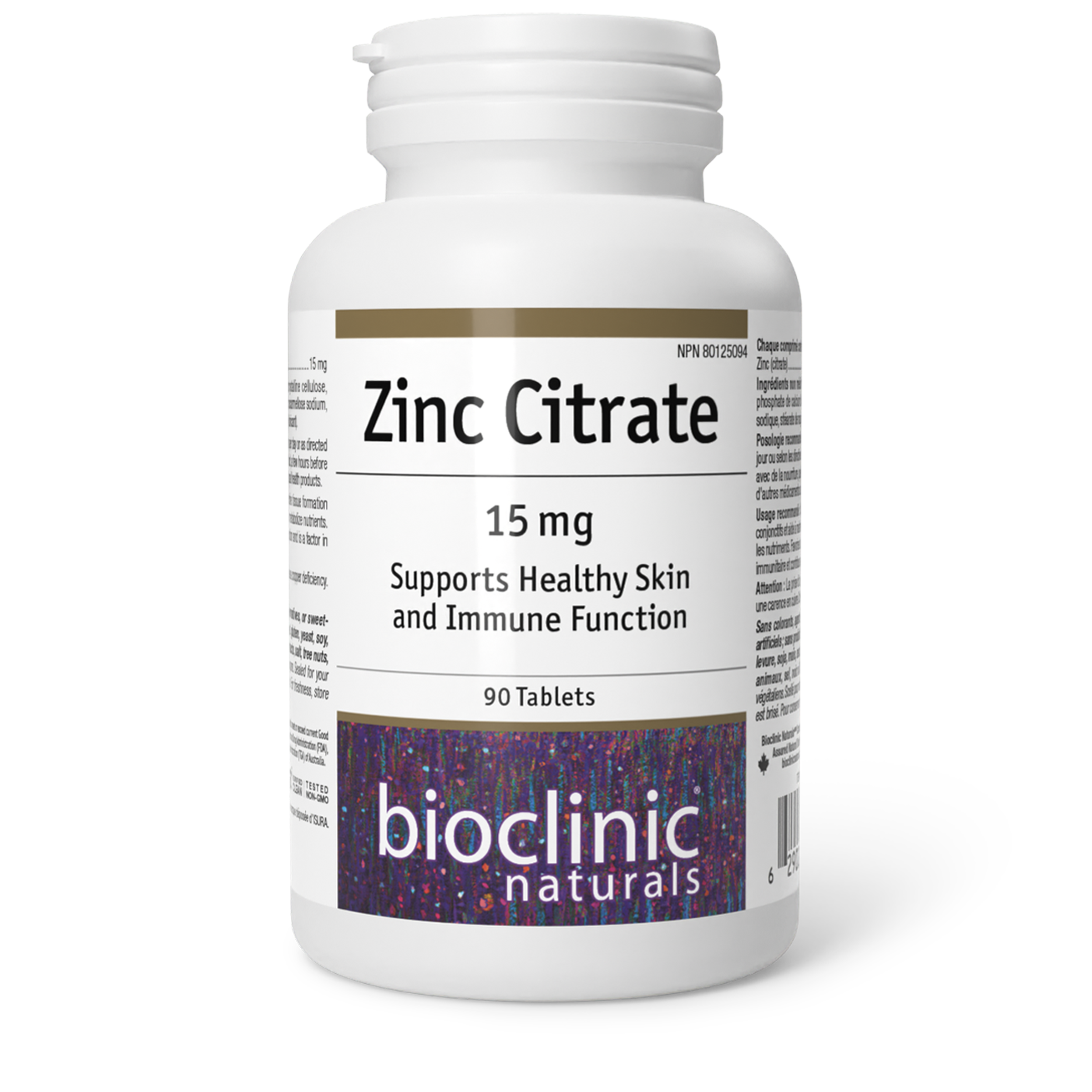
Immune Support
15 mg
90 ( SKU: 9140, NPN: 80125094 )
Benefits
- Provides 15 mg of elemental zinc per tablet
- Zinc is needed for hundreds of enzymes
- Provides support for immune, reproductive, metabolic, and musculoskeletal health
- Zinc citrate is a highly bioavailable form of zinc
- Provides a daily maintenance dose of 15 mg per serving
Feature Summary
Zinc citrate is a highly bioavailable form of this essential mineral, the second most abundant micronutrient in the body. It is needed by at least 200 enzymes and bound by nearly 3,000 proteins.1,2 Zinc is needed for a wide range of physiological functions, including those related to immune, neurological, and metabolic function, reproductive health, wound healing, and musculoskeletal growth and development. 1
Zinc deficiency, estimated to be one of the most prevalent deficiencies worldwide, has been associated with increased oxidative stress, infertility, impaired immune function, increased insulin resistance, inflammation, and altered lipid metabolism. 3-7 Zinc deficiency has also been associated with reduced testosterone levels and male infertility, while clinical trials have shown that zinc supplementation helps restore testosterone levels and improve sperm volume and quality. 8,9 Zinc supplementation has also been shown to reduce the duration and symptoms associated with upper respiratory infections, and to improve several biomarkers of cardiovascular risk and oxidative stress. 10,11
Risk for zinc deficiency is greater among children and older adults, pregnant women, people with lower dietary intake, including vegetarians/vegans and individuals on a low-calorie diet, and individuals with impaired absorption, such as those with celiac or inflammatory bowel disease. 1,12,13 Zinc citrate has been shown to be a highly bioavailable form of supplemental zinc, superior to zinc oxide and comparable to zinc gluconate. 14
Medicinal Ingredients
| Each Tablet Contains: | |
| Zinc (Citrate) | 15 mg |
Non-Medicinal Ingredients
Microcrystalline cellulose, dibasic calcium phosphate dihydrate, croscarmellose sodium, vegetable grade magnesium stearate (lubricant).
Dosage:
Recommended Adult Dose: 1–2 tablets per day or as directed by a health care practitioner. Take with food, a few hours before or after taking other medications or natural health products.
Warnings:
Zinc supplementation can cause a copper deficiency. Keep out of reach of children.
Allergens:
Contains no artificial colours, preservatives, or sweeteners; no dairy, starch, sugar, wheat, gluten, yeast, soy, corn, egg, fish, shellfish, animal products, salt, tree nuts, or GMOs. Suitable for vegetarians/vegans. Sealed for your protection. Do not use if seal is broken. For freshness, store in a cool, dry place.
Contraindications
No known contraindications.
Drug Interactions
Zinc may reduce the absorption of some medications, including fluoroquinolones and tetracycline.15,16
- Gibson, R.S., Hess, S.Y., Hotz, C., et al. (2008). Indicators of zinc status at the population level: A review of the evidence. Br J Nutr, 99(Suppl 3), S14-23.
- Maywald, M., & Rink, L. (2022). Zinc in human health and infectious diseases. Biomolecules, 12(12), 1748.
- Wessells, K.R., Singh, G.M., & Brown, K.H. (2012). Estimating the global prevalence of inadequate zinc intake from national food balance sheets: Effects of methodological assumptions. PloS One, 7(11), e50565.
- Hall, A.G., & King, J.C. (2023). The molecular basis for zinc bioavailability. Int J Mol Sci, 24(7), 6561.
- Wirth, J.P., Zeng, W., Petry, N., et al. (2023). The global burden of high fasting plasma glucose associated with zinc deficiency: Results of a systematic review and meta-analysis. PLOS Glob Public Health, 3(3), e0001353.
- Shen, H., Oesterling, E., Stromberg, A., et al. (2008). Zinc deficiency induces vascular pro-inflammatory parameters associated with NF-kappaB and PPAR signaling. J Am Coll Nutr, 27(5), 577-87.
- Shen, T., Zhao, Q., Luo, Y., et al. (2022). Investigating the role of zinc in atherosclerosis: A review. Biomolecules, 12(10), 1358.
- Te, L., Liu, J., Ma, J., et al. (2023). Correlation between serum zinc and testosterone: A systematic review. J Trace Elem Med Biol, 76, 127124.
- Zhao, J., Dong, X., Hu, X., et al. (2016). Zinc levels in seminal plasma and their correlation with male infertility: A systematic review and meta-analysis. Sci Rep, 6, 22386.
- Hunter, J., Arentz, S., Goldenberg, J., et al. (2021). Zinc for the prevention or treatment of acute viral respiratory tract infections in adults: A rapid systematic review and meta-analysis of randomised controlled trials. BMJ Open, 11(11), e047474.
- Nazari, M., Ashtary-Larky, D., Nikbaf-Shandiz, M., et al. (2023). Zinc supplementation and cardiovascular disease risk factors: A GRADE-assessed systematic review and dose-response meta-analysis. J Trace Elem Med Biol, 79, 127244.
- Ehrlich, S., Mark, A.G., Rinawi, F., et al. (2020). Micronutrient deficiencies in children with inflammatory bowel diseases. Nutri Clin Prac, 35(2), 315-22.
- Wierdsma, N.J., van Bokhorst-de van der Schueren, M.A., Berkenpas, M., et al. (2013). Vitamin and mineral deficiencies are highly prevalent in newly diagnosed celiac disease patients. Nutrients, 5(10), 3975-92.
- Wegmüller, R., Tay, F., Zeder, C., et al. (2014). Zinc absorption by young adults from supplemental zinc citrate is comparable with that from zinc gluconate and higher than from zinc oxide. J Nutr, 144(2), 132-6.
- Shakeri-Nejad, K., & Stahlmann, R. (2006). Drug interactions during therapy with three major groups of antimicrobial agents. Expert Opin Pharmacother, 7(6), 639-51.
- Mapp, R.K., & McCarthy, T.J. (1976). The effect of zinc sulphate and of bicitropeptide on tetracycline absorption. S Afr Med J, 50(45), 1829-30.
